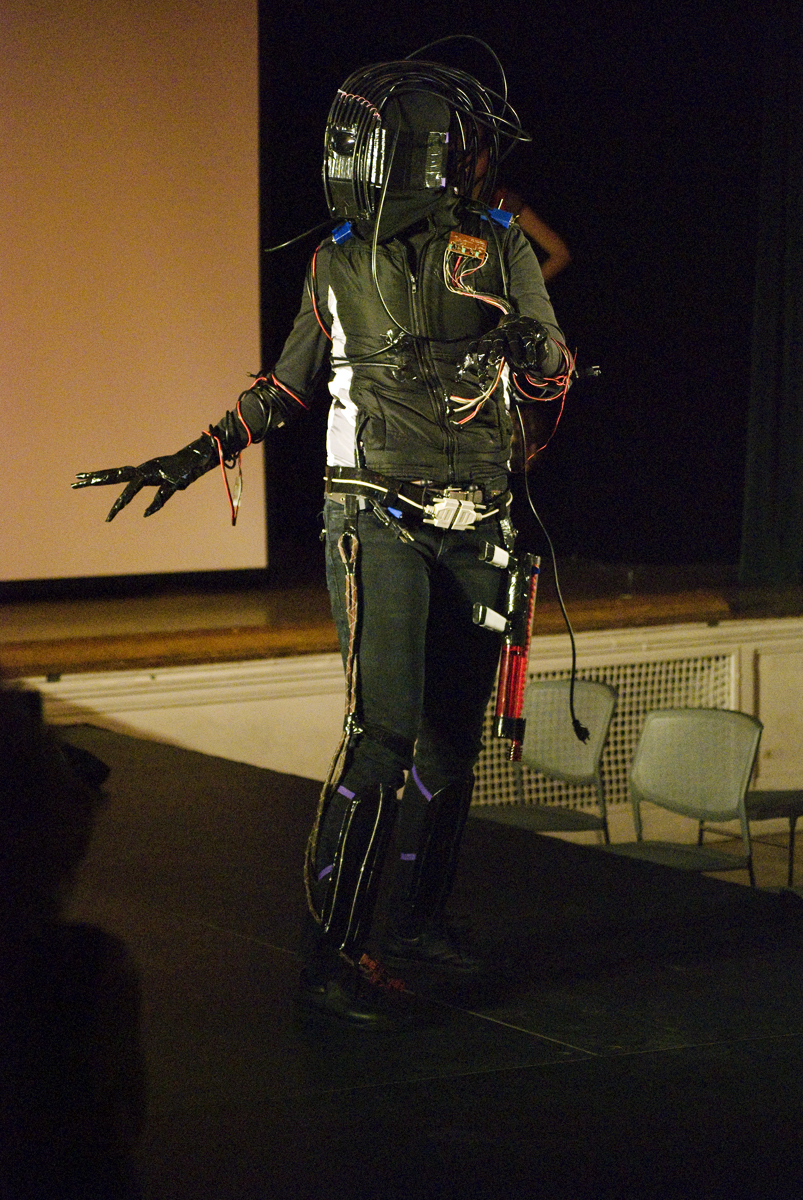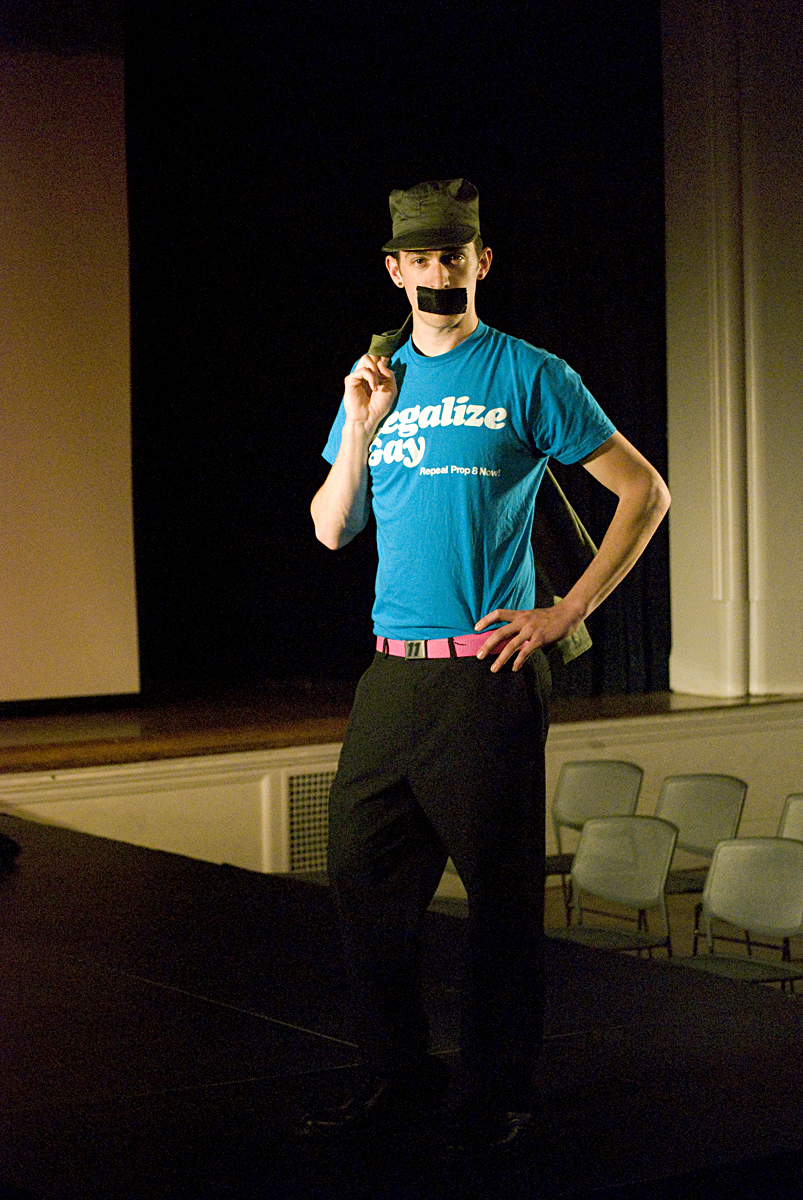Story by Jaimie Goldstein
Photos by Alex Stoltze
“We don’t need to be perfect, we just need to change the world!” announced director Carol Dennis at the Thursday evening dress rehearsal of the Resisting Militarism Fashion Show. The crowded auditorium left dozens standing in the aisles as each model presented a new look on how the military influences modern society.
The show’s selected costumes depicted problems with the military system as a whole and the effects it has left on American culture. In between looks coming down the runway, poets took the stage with fierce words about a culture made chaotic by war. Ethos caught up with two of the show’s models and director Dennis to learn more about what it means to resist militarism.
1. Anthony Tunzat, Model
For the show, Tunzat wore a green military jacket with rainbow stripes stiched in the seams, a military inspired hat, and black duct tape across his mouth. Underneath the jacket was a bright blue shirt from American Apparel that read, “Legalize Gay.”
Jaimie Goldstein: How did you get involved in the show?
Anthony Tunzat: My friend asked me to do it. She’s one of the event coordinators.
JG: What is your costume?
AT: My costume is for the Don’t Ask Don’t Tell portion of the show. It’s basically to represent all the soldiers that are in the armed forces now that are in the closet because of the Don’t Ask Don’t Tell Policy.
JG: How do you think your costume impacts the show?
AT: Showing support for those who are in uniform and gay or lesbian. I know a lot of people here in the community identify as gay or lesbian. There could be a lot of people in the community that lost family members who were in the military that were gay or lesbian.
JG: What do you want people to take away from the show?
AT: I want people to realize that war is not normal; we shouldn’t raise our children to think that war is normal. And one of the most destructive things that a gay or lesbian person can go through is going into the military because it’s so hetero-normative. There’s no support for gay and lesbian people in the military.
2. Kelsey Stilson, Designer and Model
Made totally from recycled materials, Stilson’s outfit consisted of a black jacket and ski mask covered in wires. Computer cords draped the back of the mask creating an alien-like look. Dark sunglasses covered her eyes, and no skin showed at all.
JG: What inspired you in making your costume?
KS: First thing is, I’m digital warfare so I’m looking at how the digital age is effecting how we’re fighting wars and what the future of war may be. I got the idea because I’ve always liked cyberpunk stuff, and then my teacher from my social action class told us we had to go find something to do and I found this.
JG: Are you really passionate about this show?
KS: I wasn’t at first but now the more I get into it the more I’m like, “Hey, this is real!” And it’s good to feel like you’re doing something.
JG: What do you want people to take away from this show?
KS: I want them to look at their everyday life and see where warfare is – on the computers, in the games they play, even in something as simple as a cell phone and see what it’s doing to us.
3. Carol Dennis, Director
JG: How did you get involved with the show?
CD: A member of Women’s Action for New Directions (WAND) in the community – she and I have worked on lots of community projects together and when she got involved with this, and they were looking for someone to direct, she thought of me because I’m a local director. My background professionally in New York and Los Angeles before I moved here is in theatre.
JG: How did you feel about the resisting militarism theme?
CD: Well, I buy into that 100%. I would love a bumper sticker that says, “Orwell’s 1984 was supposed to be a warning, not a blueprint.” But it has become a blueprint; that if you keep a country constantly at war, you can manipulate the people into doing anything you want, including voting against their own best interests.
We absolutely accept that it’s normal that we are a culture that is always at war. It’s how we’ve been conditioned. War is natural. Here’s the biggest thing for me: We have forgotten that we are not based on capitalism, we are based on democracy. Capitalism just happens to be our economic system, but more of our foundation is now on capitalism. Our national security and our well-being is based on how much money we can make, and not on well being. We spend much more energy on standard of living than quality of life.
JG: What do you want people to take away from this show?
CD: I think what I want to do is open a window and let the music in, you know what I mean? It’s kind of like that optical illusion where some people see the beautiful woman, but some people see the hag, but as soon as you’re shown where both of them are, you can always then find both. I want to refocus people’s eyes so that they can see it.
JG: What do you think was the biggest struggle of this show?
CD: The biggest struggle, of course, is that there’s almost no budget and everyone’s a volunteer and very busy. People who want to be involved in something like this are usually involved in a hundred other things.
JG: What are your future plans and goals for this show?
CD: I think it would be very interesting to make it like a Victory Day event. That it happens annually, just to remind us where we are and where we’re going.









